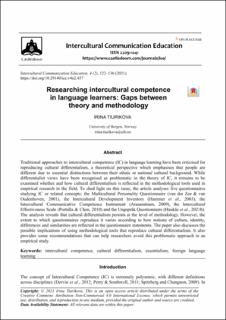Researching intercultural competence in language learners: Gaps between theory and methodology
Journal article, Peer reviewed
Published version

Åpne
Permanent lenke
https://hdl.handle.net/11250/2772912Utgivelsesdato
2021Metadata
Vis full innførselSamlinger
Originalversjon
Intercultural Communication Education. 2021, 4 (2), 122-136. https://doi.org/10.29140/ice.v4n2.437Sammendrag
Traditional approaches to intercultural competence (IC) in language learning have been criticised for reproducing cultural differentialism, a theoretical perspective which emphasises that people are different due to essential distinctions between their ethnic or national cultural background. While differentialist views have been recognised as problematic in the theory of IC, it remains to be examined whether and how cultural differentialism is reflected in the methodological tools used in empirical research in the field. To shed light on this issue, the article analyses five questionnaires studying IC or related concepts: the Multicultural Personality Questionnaire (van der Zee & van Oudenhoven, 2001), the Intercultural Development Inventory (Hammer et al., 2003), the Intercultural Communicative Competence Instrument (Arasaratnam, 2009), the Intercultural Effectiveness Scale (Portalla & Chen, 2010) and the UNGSPRÅK Questionnaire (Haukås et al., 2021b). The analysis reveals that cultural differentialism persists at the level of methodology. However, the extent to which questionnaires reproduce it varies according to how notions of culture, identity and differences are reflected in the questionnaire statements. The concluding section discusses the possible implications of using methodological tools that reproduce cultural differentialism. It also provides some recommendations that can help researchers avoid this problematic approach in an empirical study.
